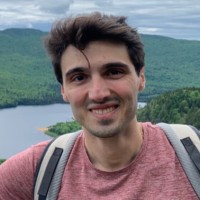Students Win Big at Annual Innovate@BU New Venture Competition
 Stamatios Liapis, a computational neuroscience PhD candidate at Boston University Chobanian & Avedisian School of Medicine and his team won first place and $20,000 in Boston University’s annual New Venture Competition for his startup company named Enlaye. Enlaye is a cloud-based contract writing and negotiation deep-collaboration platform that makes writing contracts as a team faster, cheaper and clearer.By taking a more collaborative approach to contract writing, Enlaye modernizes the antiquated contract process.
Stamatios Liapis, a computational neuroscience PhD candidate at Boston University Chobanian & Avedisian School of Medicine and his team won first place and $20,000 in Boston University’s annual New Venture Competition for his startup company named Enlaye. Enlaye is a cloud-based contract writing and negotiation deep-collaboration platform that makes writing contracts as a team faster, cheaper and clearer.By taking a more collaborative approach to contract writing, Enlaye modernizes the antiquated contract process.
Liapis’ research focuses on bridging the gap between human and artificial intelligence (AI) by understanding and modeling how networks of neurons in the brain solve problems that AI algorithms cannot yet solve. To this end, he studies how the human brain extracts patterns from the environment and uses these patterns to form generative models that help make smart predictions in novel scenarios. “My favorite thing about Enlaye is its network architecture, which is inspired by my research into how networks in the brain work and interact to solve complex problems,” says Liapis.
 Fourth-year medical student Shen Ning, took home the third-place General Track prize of $6,000 for INIA Biosciences. INIA has created the next generation of smart wearable ultrasound device to non-invasively modulate the immune system, reducing the lifetime accumulation of side effects from immunosuppressive drugs. Ning was inspired by biotechnology and the possibilities it offered to patients around the world. The technology takes advantage of the body’s normal ability to control the immune system through nerves and can provide a personalized stimulus to modulate the immune system without side-effects. “I am excited about how new treatment modalities like ultrasound can help to revolutionize how we think about therapeutics. Our technology has the advantage of being non-invasive and allows for the incorporation of a digital health component to enable remote patient monitoring for improved compliance and earlier intervention,” said Ning.
Fourth-year medical student Shen Ning, took home the third-place General Track prize of $6,000 for INIA Biosciences. INIA has created the next generation of smart wearable ultrasound device to non-invasively modulate the immune system, reducing the lifetime accumulation of side effects from immunosuppressive drugs. Ning was inspired by biotechnology and the possibilities it offered to patients around the world. The technology takes advantage of the body’s normal ability to control the immune system through nerves and can provide a personalized stimulus to modulate the immune system without side-effects. “I am excited about how new treatment modalities like ultrasound can help to revolutionize how we think about therapeutics. Our technology has the advantage of being non-invasive and allows for the incorporation of a digital health component to enable remote patient monitoring for improved compliance and earlier intervention,” said Ning.
Ning is a MD-PhD candidate interested in developing translational technologies to tackle unmet clinical needs.
Students and young alums who entered the New Venture Competition chose one of two tracks in which to compete: the General Track (for-profit ventures in any sector) or the Social Impact Track (ventures addressing large-scale economic, societal, or environmental issues and/or focusing on underserved communities). Teams completed three rounds of competition starting in February, including a written application and two in-person pitches, before heading to the finals.
An estimated 300 people attended the event, which included a dozen finalist teams, all in early stages of entrepreneurial ventures, pitching their ideas for how to address largely unmet needs within the community. Hailed as BU’s largest pitch event, the competition awarded over $72,000 total in prizes.